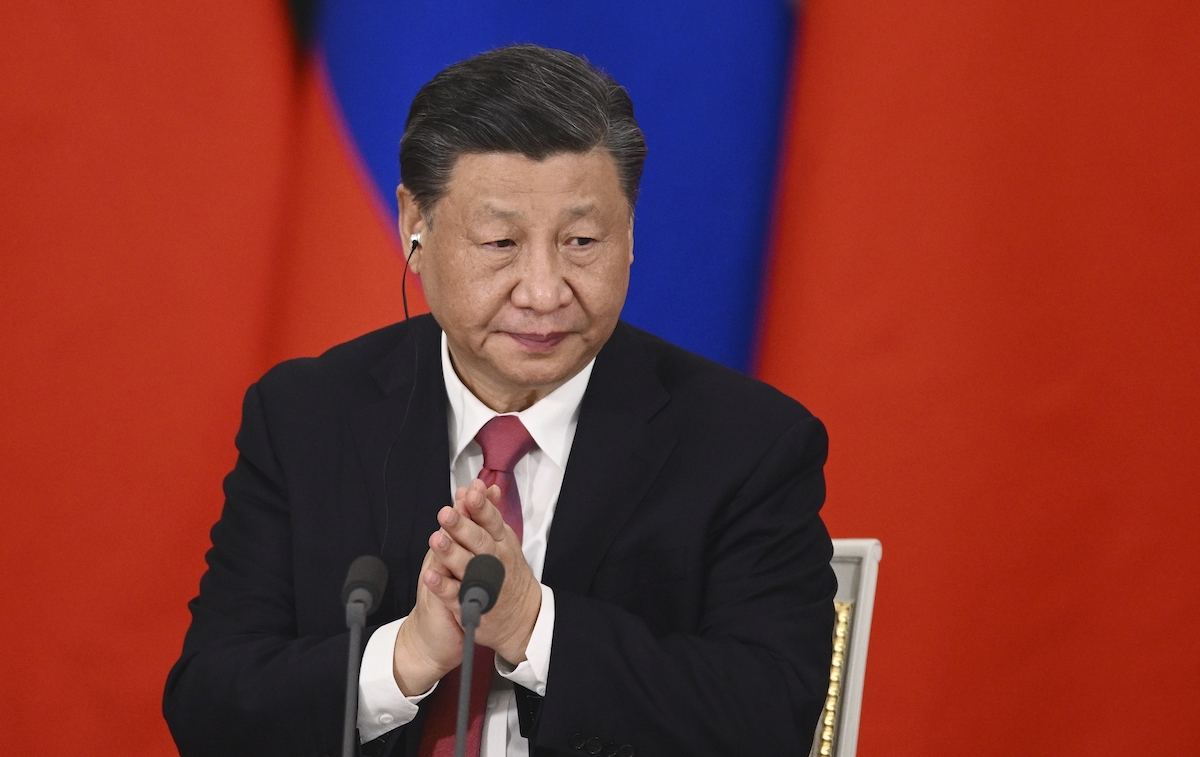Chinese Communist Party (CCP) General Secretary Xi Jinping secured a third term last October. He continues to transform what once was loose authoritarian rule into a near-totalitarian system. In almost every area, the CCP has increased its power over the Chinese people, demanding absolute obedience. A new report from the group ChinaAid, headed by Bob Fu, details the party’s increasing efforts to “Sinicize” religion, forcing it to serve Xi and the CCP.
Xinjiang’s Muslim Uyghurs suffer particularly brutal treatment because Beijing fears both their faith and their ethnicity, and the potential for separatism. The CCP also abhors Christianity for its foreign roots. Yet Daoism and Buddhism, faiths with an ancient Chinese heritage, are under assault by the regime as well.
Mao Zedong’s China was a totalitarian hellhole, an imperial throwback, with a red rather than royal emperor. Mao viewed religion as communism’s enemy. His death in 1976 resulted in widespread liberalization of Chinese society, though the Tiananmen Square crackdown demonstrated the limits of political reform. Even so, the CCP relaxed its control over people’s lives, including spiritual pursuits.
Persecution was still real but concentrated at the provincial level, varying widely in degree. Believers were often left alone if they avoided politics. When visiting Beijing in 2014, I glimpsed a Christian “fish” decal on an auto bumper in Beijing, a striking sight with Mao’s portrait still hanging on the Gate of Heavenly Peace bordering Tiananmen Square.
Those were the “good old days.” While devoting more money to maintain domestic order than to protect the country from foreign threats, the People’s Republic of China has constructed an intrusive regulatory bureaucracy over religion. As the United States Commission on International Religious Freedom reports: “The ruling Chinese Communist Party (CCP) and its government exercise comprehensive and extensive control over religion in China through a complex web of state laws, regulations, and policies, which the Party and government agencies implement and enforce at all levels.”
Xi insists that the faithful believe in communism, not God. The USCIRF cited a speech in which “he called on state-controlled religious groups to ‘promote patriotism’ and to ‘continuously enhance [their] identification with the great motherland, the Chinese nation, the Chinese Communist Party, and [Chinese socialism].’ Xi also said that representatives of religious groups must be ‘politically reliable’ and able to ‘play a role during critical times.’”
In the aftermath of the 20th National Congress, which seminarians were required to watch, CCP regulatory agencies organized events at the national and provincial level to instruct employees how to implement the party’s new dictates. These followed earlier programs tied to National Security Education Day. ChinaAid notes that “various activities by state-run Christian churches sprang up before and after this day.” In Sichuan province, for instance, the governing slogan for religious believers was “Establishing a strong sense of national security. Experiencing and understanding the achievements of national security in this new era. Creating a positive atmosphere for the successful launch of the CCP’s 20th National Congress.”
Alas, indoctrination may be the least coercive weapon deployed by the Chinese government. ChinaAid has detailed the CCP’s increasingly brutal assault on religion: demolishing sanctuaries and other church buildings, closing churches and other religious organizations, arresting and imprisoning church leaders and members, “disappearing” church officials, raiding and otherwise disrupting religious services, interfering with baptisms, withholding ministerial credentials, banning online church activities, mistreating religious prisoners, prohibiting evangelism, fining church leaders and other participants, restricting publication and sale of religious materials, punishing Christian political and legal activists, restricting Christian students from studying abroad, closing Christian schools and punishing other forms of religious education, and censoring online religious content.
ChinaAid also publishes an annual guide detailing the 10 worst cases in which people were punished, often severely, for attempting to exercise the same freedoms Americans take for granted. Other organizations also track the CCP’s assault on religious liberty in China. For instance, International Christian Concern describes acts of persecution by category and number. Noted ICC: “The government’s scrutiny of Christians is part of a wider effort to Sinicize the country by coercing religious groups to submit to the communist CCP ideology.”
As noted above, while Christians suffer much religious persecution, other faiths suffer as well, mostly for the same reason. The USCIRF has reported that “although China recognizes Buddhism, Catholicism, Islam, Protestantism, and Taoism, adherents of groups with perceived foreign influence—such as underground Catholics, house church Protestants, Uyghurs and other Muslims, and Tibetan Buddhists—and those from other religious movements, such as Falun Gong and the Church of Almighty God, are especially vulnerable to persecution.” Moreover, despite the Vatican’s agreement with Beijing, seen as a surrender by many, the communist “authorities continued to harass and detain underground Catholic priests who refuse to join the state-controlled Catholic association.”
Yet even after enhancing surveillance, tightening censorship, and increasing punishments, Xi and the CCP have failed to prevent Chinese from answering God’s call. With between 93 million and 115 million Protestants in China by one estimate, along with 10 to 12 million Catholics and additional adherents to other faiths, CCP members are badly outnumbered by religious believers. No wonder communist apparatchiks are nervous. Hence their desperate campaign to suppress religious faith and coopt religious organizations.
Yet the CCP will fail. People of faith, especially leaders in underground churches, are paying a terrible price for living their beliefs. Yet the regime is stoking, not eradicating, opposition. Most Chinese Christians simply want to be left alone to worship God. By attacking their most important beliefs, the CCP has forced believers to resist ever more vigorously the regime’s dictates.
For example, Christians made up a disproportionate share of human rights lawyers, most of whom have since been disbarred or imprisoned by the Xi government. Many Chinese house churches further decentralized their activities to avoid detection, while some congregations turned out to defend their sanctuaries from government assault. These battles left them with little doubt that the CCP was not their friend but God’s enemy. As government repression continues to rise, so will resistance, even if largely driven underground. As Duke University’s Lian Xi observed, Christians “have come to see the political potential of Christianity as a force for change.”
This means that more Chinese are likely to turn to God. The PRC suffers from a spiritual vacuum, in which the Communist Party is unable to meet the Chinese people’s deepest needs. Indeed, the young have unsettled Xi and the regime by rebelling against their elders’ expectations, adopting the memes “lying flat” and “let it rot.” The Chinese people evidently yearn for more than party propaganda.
In fact, popular frustration dramatically burst forth last fall with protests against the regime’s draconian COVID regulations. The CCP has nothing to offer in the battle to win hearts and minds. In contrast, Christians and other believers offer community, meaning, and hope. As Lian explained: “What really makes the government nervous is Christianity’s claim to universal rights and values.”
Apparently Xi believes he can suppress one of mankind’s deepest impulses. Thousands of years of human experience demonstrate that he is wrong. Like King Herod Agrippa, Xi might rue demanding that people treat him and his party as demi-gods.

